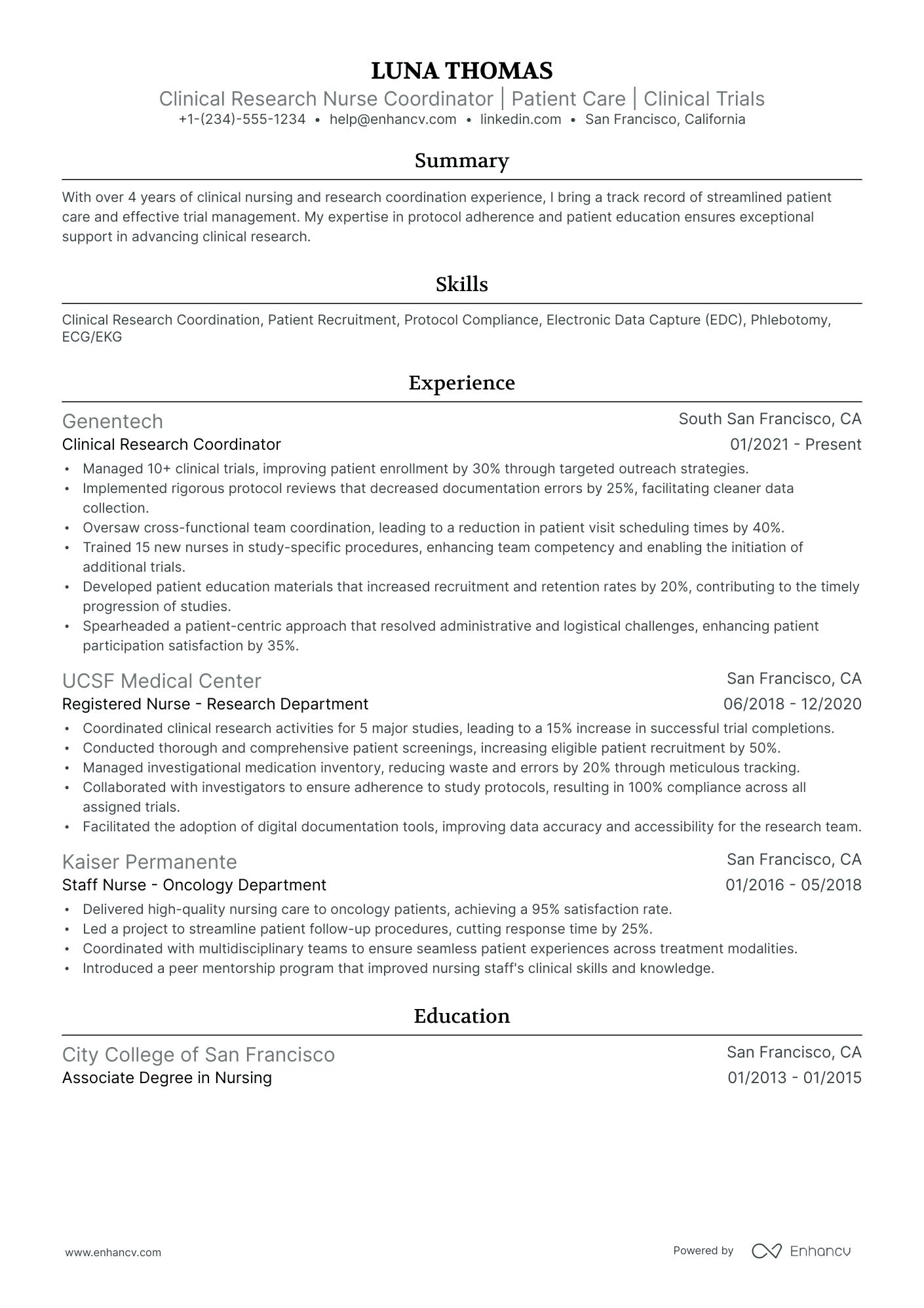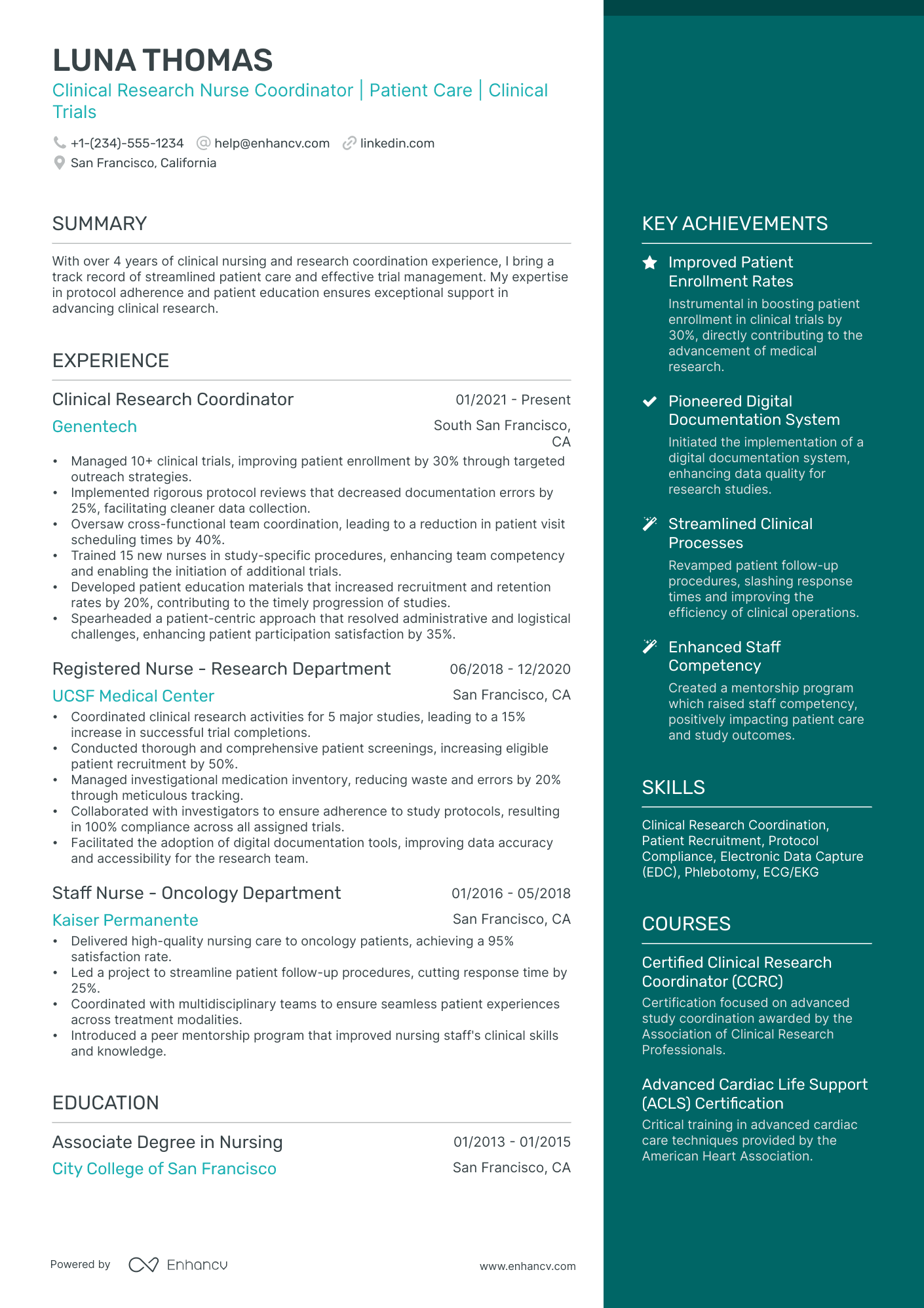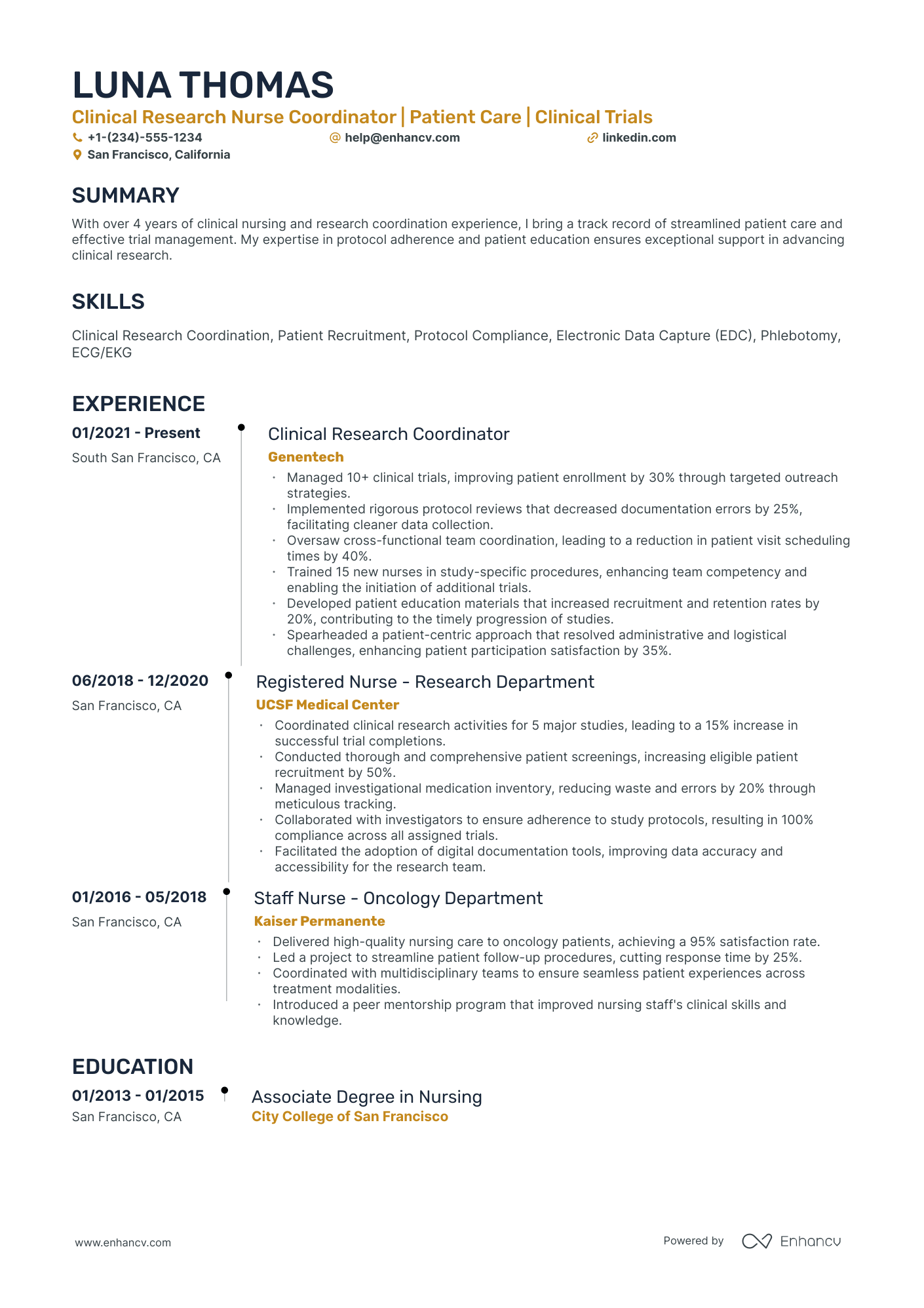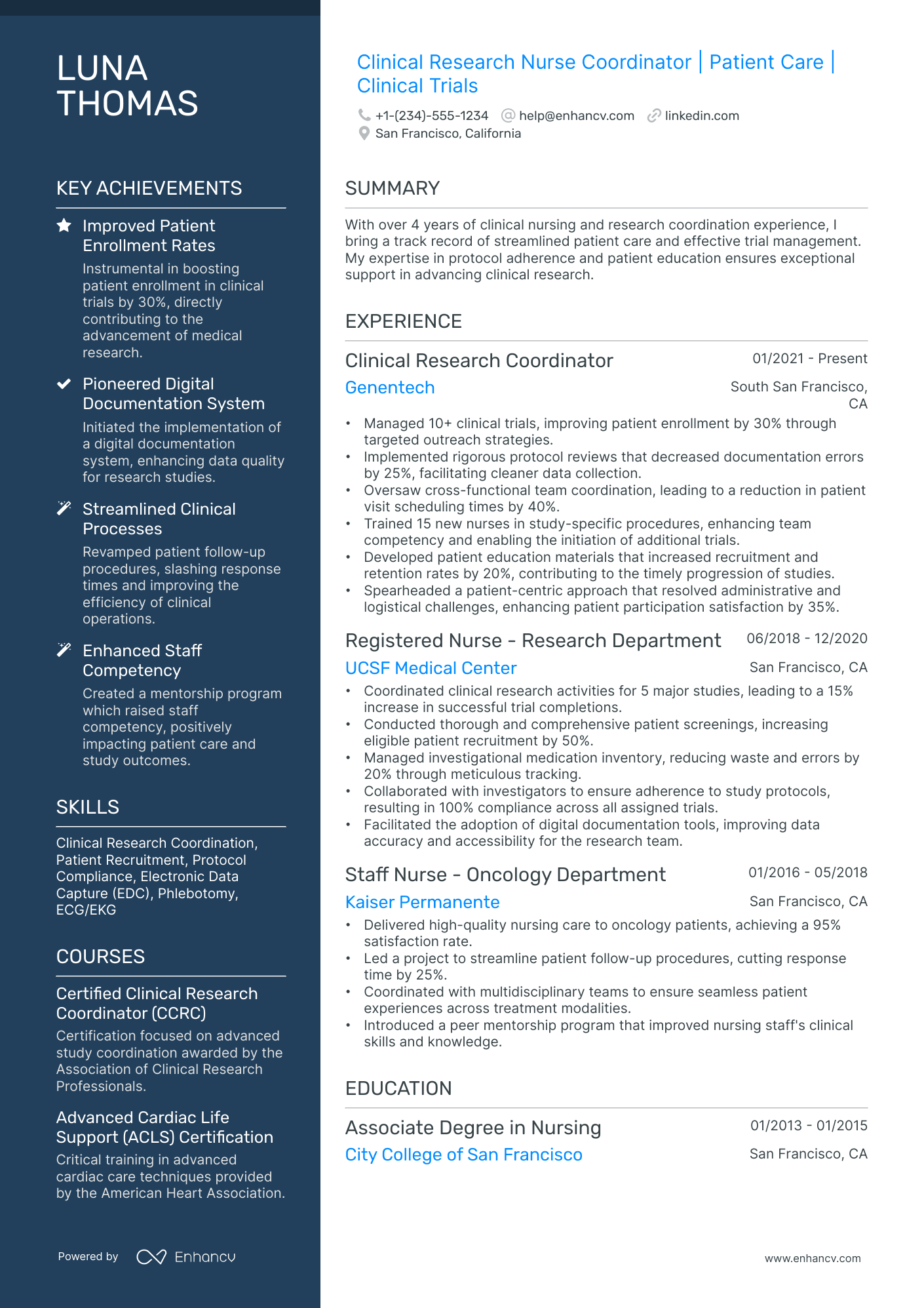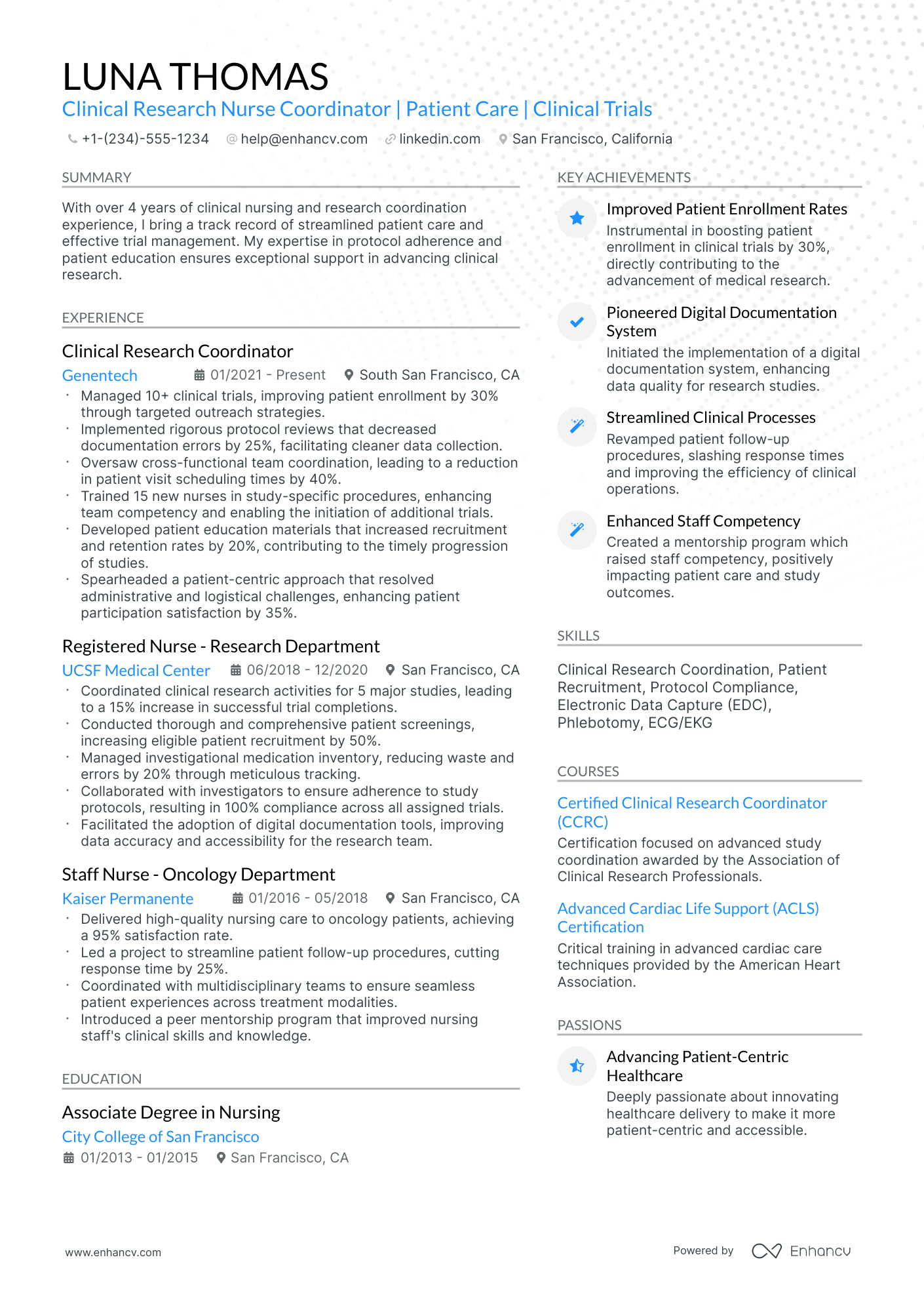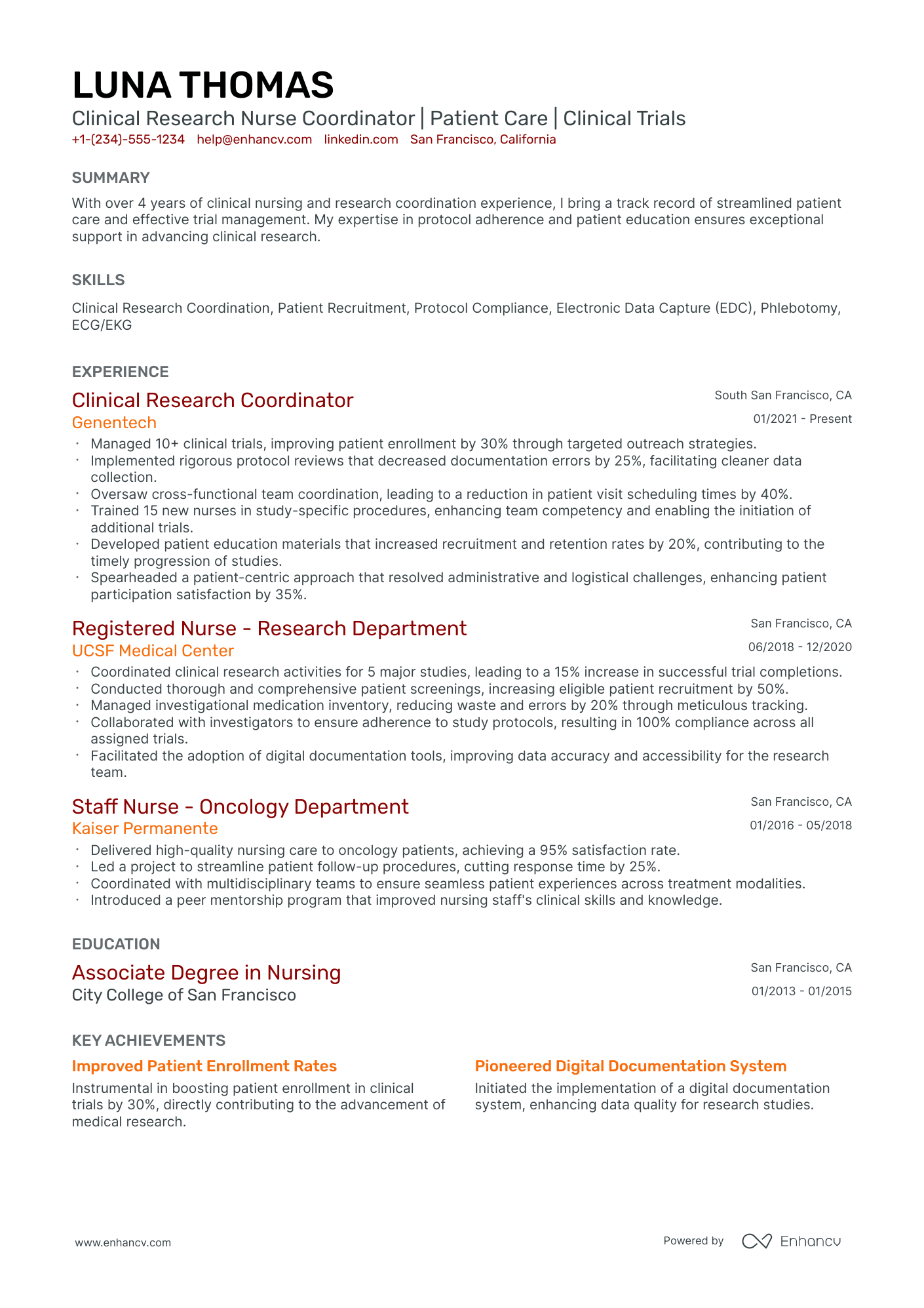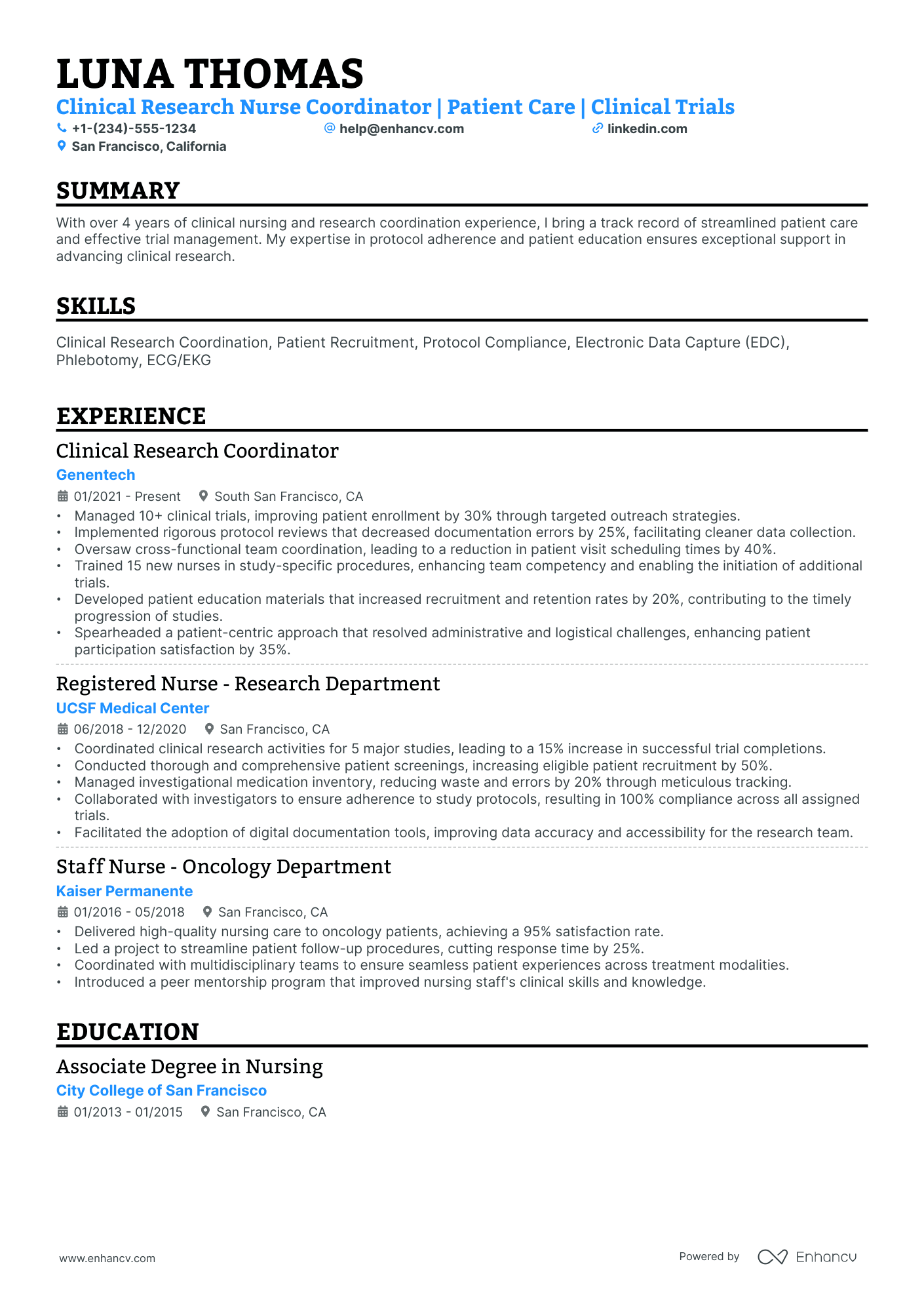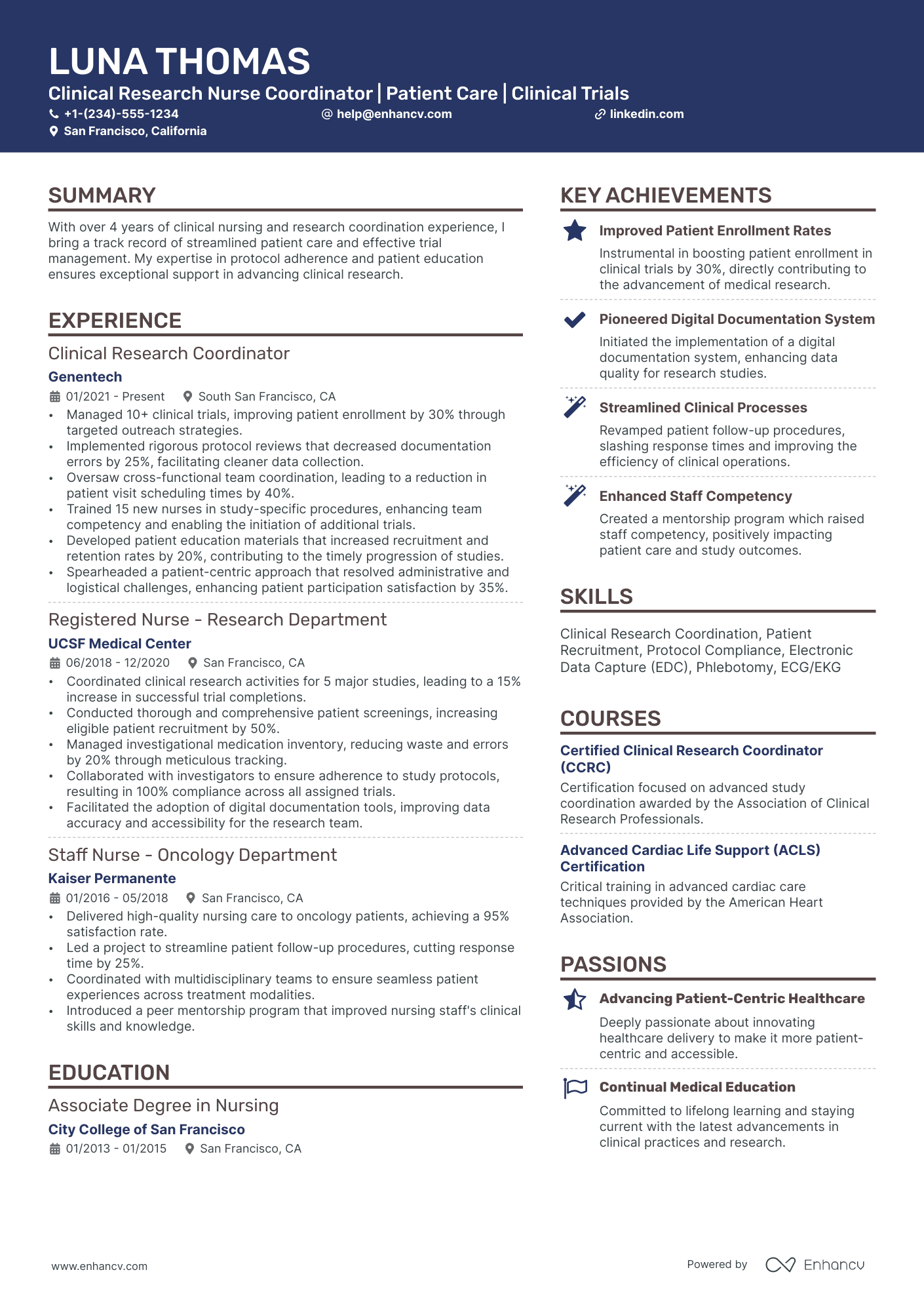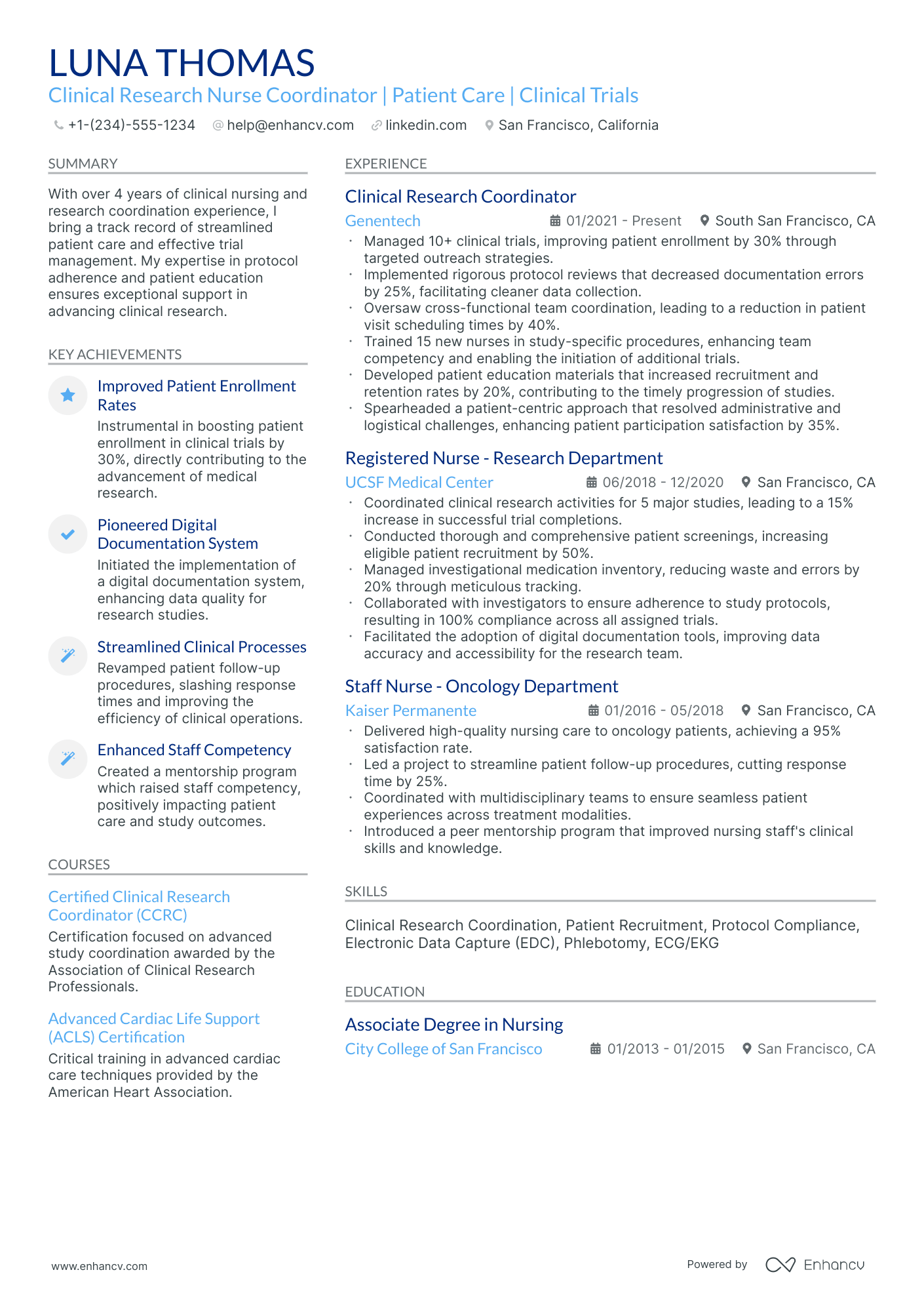One specific resume challenge you might face as a clinical research nurse is effectively highlighting your experience in patient care and protocol compliance across diverse studies. Our guide can provide you with targeted advice to showcase your specialized skills and knowledge, ensuring your resume stands out to hiring managers in the competitive field of clinical research.
- Format your clinical research nurse resume to ensure that it balances professionalism with creativity, and follows the best practices.
- Match the clinical research nurse job requirements by including industry keywords on your resume.
- Use various resume sections to showcase your skills and achievements to answer why you're the best candidate for the clinical research nurse role.
Take inspiration from leading clinical research nurse resume examples to learn how to tailor your experience.
- Ob Nurse Resume Example
- LPN Resume Example
- Nicu Nurse Resume Example
- Clinical Nurse Manager Resume Example
- Clinical Pharmacist Resume Example
- Healthcare Resume Example
- Clinical Trial Manager Resume Example
- Staff Nurse Resume Example
- Assistant Nurse Resume Example
- Ob Gyn Medical Assistant Resume Example
How to style your clinical research nurse resume: layout and format
When creating your clinical research nurse resume, have you ever wondered how long it should be? Experts point out that it should be between one and two pages. Choose the longer format, if you happen to have over a decade of relevant experience. What is more, resume formats play a crucial role in presenting your experience. Use the:- Reverse-chronological resume format to highlight your experience;
- Functional skill-based resume format if you have less experience and want to focus on skills;
- Hybrid resume format to guide recruiters through both your experience and skills.
- Make sure your headline is simple and includes the job you're applying for or your current role, an abbreviation of a certificate you have, or even your professional area of interest;
- Always tailor your clinical research nurse resume to the role you're applying for by matching job requirements to your experience via different resume sections;
- Once you've created your resume, download it in PDF (unless otherwise specified). This is to ensure readability and that the layout remains fixed.
Tailor your resume format to the job market – a Canadian resume, for example, might differ in layout.
Upload & Check Your Resume
Drop your resume here or choose a file. PDF & DOCX only. Max 2MB file size.
PRO TIP
List your educational qualifications and certifications in reverse chronological order.
The five (plus) definite sections your resume for a clinical research nurse job should include are:
- Header with your headline, contact details, and/or a preview of your work
- Summary (or objective) to pinpoint how your success aligns with the role
- Experience with bullets of your most relevant achievements in the field
- Skills to integrate vital job requirements (both technical and personal)
- Your further dedication to the field, showcased via relevant higher education and/or certifications
What recruiters want to see on your resume:
- Demonstrated experience in clinical trial management, including patient recruitment, consent, and compliance with study protocols.
- Knowledge of Good Clinical Practice (GCP), FDA regulations, and other regulatory requirements relevant to clinical research.
- Proficient in data collection, management, and reporting, including use of Electronic Data Capture (EDC) systems and proper handling of Case Report Forms (CRFs).
- Strong interpersonal and communication skills, essential for collaboration with multidisciplinary research teams and providing patient education and support.
- Experience in adverse event reporting and management, underscored by a commitment to patient safety and ethical considerations in research.
Advice for your clinical research nurse resume experience section - setting your application apart from other candidates
Your resume experience section needs to balance your tangible workplace achievements with job requirements.
The easiest way to sustain this balance between meeting candidate expectations, while standing out, is to:
- Select really impressive career highlights to detail under each experience and support those with your skills;
- Assess the job advert to define both the basic requirements (which you could answer with more junior roles) and the more advanced requirements - which could play a more prominent role through your experience section;
- Create a separate experience section, if you decide on listing irrelevant experience items. Always curate those via the people or technical skills you've attained that match the current job you're applying for;
- Don't list experience items from a decade ago - as they may no longer be relevant to the industry. That is, unless you're applying for a more senior role: where experience would go to demonstrate your character and ambitions;
- Define how your role has helped make the team, department, or company better. Support this with your skill set and the initial challenge you were able to solve.
Take a look at how real-life clinical research nurse professionals have presented their resume experience section - always aiming to demonstrate their success.
- Spearheaded the clinical trial of a new cardiac drug, overseeing 50+ patients through the trial phases, which improved patient outcomes by 25%.
- Established a compliance framework in alignment with FDA regulations, leading to a 100% audit success rate over the past 2 years.
- Developed and implemented a patient education program that decreased trial attrition rates by 15% due to better patient engagement and understanding.
- Led a cross-functional team through a complex oncology study which resulted in the successful submission of findings to a peer-reviewed journal.
- Managed the data collection and analysis for over 30 clinical trials, using advanced biostatistical tools to enhance data reliability.
- Initiated improvements to patient screening procedures that reduced the time to enroll patients by 20%, accelerating the trial timeline.
- Conducted thorough patient assessments to determine eligibility for participation in neurology trials, increasing enrollment by 30%.
- Collaborated closely with pharmaceutical sponsors to ensure adherence to study protocols and timely delivery of trial materials.
- Authored a patient follow-up process that led to a 10% improvement in long-term study adherence and quality of life measures.
- Managed the logistical aspects of clinical trial operations, successfully coordinating studies across 10 different hospital sites.
- Evaluated and integrated patient-focused technology solutions which increased participant reporting accuracy by 35%.
- Facilitated training for new clinical research staff, resulting in a 40% improvement in trial operation efficiency.
- Oversaw all phases of a landmark diabetes study, which has defined the new standard of care in diabetes management.
- Implemented a robust electronic data capture system that reduced manual errors by 90%, ensuring high-quality trial data.
- Acted as a liaison between the research team and the institutional review board, maintaining ethical standards across all clinical trials.
- Developed a novel patient consent protocol which boosted participation willingness and reduced consent withdrawal by 25%.
- Analyzed and reported on trial data, presenting findings at 3 major national conferences, increasing the visibility of the research institution.
- Established a patient advocacy board that included past clinical trial participants, which informed improvements to study design and patient care.
- Orchestrated the transition to a new clinical trial management system that decreased administrative workload by 50%.
- Pioneered a patient retention strategy that saw a 20% decrease in patient withdrawal, enhancing the integrity of longitudinal studies.
- Enhanced cross-departmental collaboration, establishing efficient communication channels that reduced project lead times by 15%.
- Played a critical role in expanding the hospital's clinical research unit, doubling its capacity and increasing the number of trials conducted annually.
- Led a drive to improve patient-centric care during trials, which increased patient satisfaction scores by 30% and attracted more funding.
- Optimized the use of a centralized monitoring system for adverse events, improving patient safety and reducing severe adverse events by 20%.
Quantifying impact on your resume
- Include the number of clinical trials you have coordinated or assisted with to demonstrate the extent of your experience.
- Specify the amount of funding you have managed for research projects to showcase your financial responsibility.
- Detail the number of patients enrolled in studies to illustrate your recruitment capabilities.
- Mention the quantity of data points collected and analyzed to highlight your meticulous data management skills.
- State the number of research publications and presentations you have contributed to, emphasizing your involvement in knowledge dissemination.
- Count the different therapeutic areas you have worked in to show the breadth of your clinical knowledge.
- Report the number of regulatory audits you have successfully passed to underline your compliance with industry standards.
- Record the percentage of trials you completed on time or ahead of schedule to reflect your efficiency and project management skills.
Action verbs for your clinical research nurse resume
What can candidates do about their resume, if they have no experience
Job requirements can sometimes be answered by other elements you could make more prominent in your clinical research nurse resume.
Thus, you'd be substituting your lack of experience with your relevant:
- Education with details of skills you've obtained that align with the job
- Internships and short-term jobs that are once more dedicated to putting your expertise in the spotlight
- Skills section answering basic and - potentially - more specific job qualifications
- Strengths or accomplishments to show the unique value you present, even as a candidate with less or no professional experience in the industry.
Recommended reads:
PRO TIP
If you're in the process of obtaining your certificate or degree, list the expected date you're supposed to graduate or be certified.
Key hard skills and soft skills for your clinical research nurse resume
At the top of any recruiter clinical research nurse checklist, you'd discover a list of technical competencies, balanced with personal skills.
Hard or technical skills are your opportunity to show how you meet the essential responsibilities of the role. The ability to use a particular job-crucial technology or software would also hint to recruiters whether you'd need a prolonged period of on-the-job training - or you'd fit right in the job.
But to land your dream role, you'd also need to demonstrate a variety of soft or people resume skills . Employers care about soft skills as they show how each candidate would fit into the team and company culture.
Both types of skills are specific and to best curate them on your resume, you'd need to:
- Create a skill section within which you showcase your hard and soft skills and present how they help you succeed.
- List specific examples of projects, tasks, or competitions, within which your skill set has assisted your results.
- Soft skills are harder to measure, so think about situations in which they've helped you thrive. Describe those situations concisely, focusing on how the outcome has helped you grow as a professional.
- Metrics of success - like positive ROI or optimized workplace processes - are the best way to prove your technical and people skills.
Take a look at some of clinical research nurse industry leaders' favorite hard skills and soft skills, as listed on their resumes.
Top skills for your clinical research nurse resume:
Clinical trial management software
Electronic data capture (EDC) systems
Good Clinical Practice (GCP) guidelines
Patient assessment and monitoring tools
Laboratory information management systems (LIMS)
Statistical analysis software (e.g., SAS, SPSS)
Clinical research documentation
Regulatory compliance tools
Data management systems
Medical coding software
Communication skills
Attention to detail
Critical thinking
Team collaboration
Empathy and compassion
Problem-solving skills
Time management
Adaptability
Organizational skills
Interpersonal skills
PRO TIP
List all your relevant higher education degrees within your resume in reverse chronological order (starting with the latest). There are cases when your PhD in a particular field could help you stand apart from other candidates.
How to include your education and certifications on your resume
We're taking you back to your college days with this part of our guide, but including your relevant higher education is quite important for your resume.
Your degree shows recruiters your dedication to the industry, your recent and relevant know-how, and some form of experience in the field.
Your clinical research nurse resume education should:
- Include your applicable degrees, college (-s) you've graduated from, as well as start and end dates of your higher education;
- Skip your high school diploma. If you still haven't graduated with your degree, list that your higher education isongoing;
- Feature any postgraduate diplomas in your resume header or summary - this is the perfect space to spotlight your relevant MBA degree;
- Showcase any relevant coursework, if you happen to have less professional experience and think this would support your case in being the best candidate for the role.
As far as your job-specific certificates are concerned - choose up to several of the most recent ones that match the job profile, and include them in a dedicated section.
We've saved you some time by selecting the most prominent industry certificates below.
The top 5 certifications for your clinical research nurse resume:
- Certified Clinical Research Professional (CCRP) - Society of Clinical Research Associates (SOCRA)
- Certified Clinical Research Coordinator (CCRC) - Association of Clinical Research Professionals (ACRP)
- Oncology Certified Nurse (OCN) - Oncology Nursing Certification Corporation (ONCC)
- Certified Research Nurse (CRN) - No specific institution, it's a designation used by nurses who have gained experience and knowledge in the field.
- Advanced Oncology Certified Nurse (AOCN) - Oncology Nursing Certification Corporation (ONCC)
PRO TIP
The more trusted the organization you've attained your certificate (or degree) from, the more credible your skill set would be.
Recommended reads:
Should you write a resume summary or an objective?
No need to research social media or ask ChatGPT to find out if the summary or objective is right for your clinical research nurse resume.
- Experienced candidates always tend to go for resume summaries. The summary is a three to five sentence long paragraph that narrates your career highlights and aligns your experience to the role. In it you can add your top skills and career achievements that are most impressive.
- Junior professionals or those making a career change, should write a resume objective. These shouldn't be longer than five sentences and should detail your career goals . Basically, how you see yourself growing in the current position and how would your experience or skill set could help out your potential employers.
Think of both the resume summary and objective as your opportunity to put your best foot forward - from the get go - answering job requirements with skills.
Use the below real-world clinical research nurse professional statements as inspiration for writing your resume summary or objective.
Resume summaries for a clinical research nurse job
- With a decade of experience in oncology clinical research, I've developed expertise in orchestrating complex trials and advancing patient care through meticulous data analysis. My tenure includes a pivotal trial resulting in an FDA-approved therapy, showcasing my commitment to transformative healthcare outcomes.
- Accomplished pharmacist with 7 years of experience transitioning into clinical research nursing to leverage my extensive knowledge in pharmacology and patient counseling. Responsible for leading medication adherence programs, my expertise will facilitate robust clinical trial management and superior participant support.
- Dedicated Registered Nurse with 15 years in a fast-paced hospital environment, aspiring to apply my clinical expertise and compassionate patient care to the clinical research field. With strong leadership in critical care units, I seek to contribute to groundbreaking studies and patient-centric research methodologies.
- Expert in biostatistics and data management, seeking to pivot into clinical research nursing. Bringing forth 8 years of experience in health data analysis within government agencies, I am poised to employ my quantitative skills and knowledge of health protocols to enhance trial accuracy and efficacy.
- Eager to embark on a career as a clinical research nurse with no prior direct experience in the field but equipped with a solid foundation in health sciences. My academic excellence and unwavering commitment to patient welfare form the cornerstone of my desire to impact clinical trials and advancements in medicine.
- Aspiring clinical research nurse committed to entering the field, bringing a fresh perspective grounded in a BSc Nursing degree and volunteer experience with medical nonprofits. Motivated to integrate my caregiving skills and passion for learning to support innovative clinical studies and improve patient health outcomes.
Optimize your resume summary and objective for ATS
Drop your resume here or choose a file.
PDF & DOCX only. Max 2MB file size.
Other relevant sections for your clinical research nurse resume
Apart from the standard clinical research nurse resume sections listed in this guide, you have the opportunity to get creative with building your profile. Select additional resume sections that you deem align with the role, department, or company culture. Good choices for your clinical research nurse resume include:
- Language skills - always ensure that you have qualified each language you speak according to relevant frameworks;
- Hobbies - you could share more about your favorite books, how you spend your time, etc. ;
- Volunteering - to highlight the causes you care about;
- Awards - for your most prominent clinical research nurse professional accolades and achievements.
Make sure that these sections don't take too much away from your experience, but instead build up your clinical research nurse professional profile.
Key takeaways
- The layout of your resume should take into consideration your professional background while integrating vital sections and design elements;
- Highlight your most pertinent achievements for the role all through different sections;
- Be very specific when selecting your certifications, hard skills, and soft skills to showcase the best of your talents;
- Include within the top one-third of your clinical research nurse resume a header and summary to help recruiters understand your experience and allocate your contact details. A skills box is optional, but it will help you align your expertise with the role;
- Detail the full extent of your professional experience with specific bullets that focus on tasks, actions, and outcomes.
